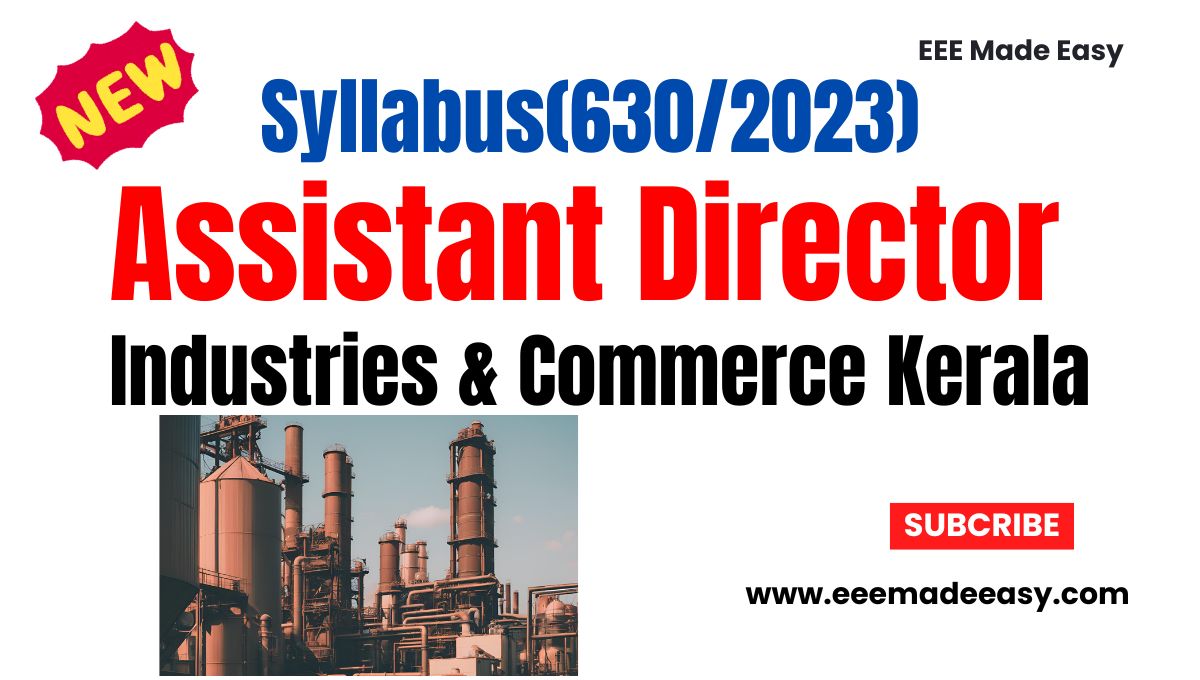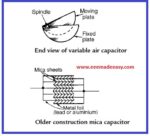Assistant Director industries and commerce Kerala PSC syllabus: In this post, the LATEST syllabus of Assistant Director in Industries and Commerce is given. Main topics are Engineering Mathematics, Engineering Physics, Engineering Chemistry and Business Administration.
Main Topics – Assistant Director Industries & Commerce Kerala
- Engineering Mathematics (40 Marks)
- Engineering Physics (15 Marks)
- Engineering Chemistry (15 Marks)
- Business Administration (30 Marks)
Check: [New Book List]Assistant director industries and commerce Books Based on New Syllabus
Other Important links for Assistant director Industries and commerce
- Assistant Director Industries and Commerce Syllabus
- Assistant Director Industries and CommerceQuestion paper
- [Book List]Assistant director industries and commerce Books
- [UPDATED]Assistant Director industries and commerce Kerala PSC syllabus|630/2023 syllabus
- [PDF]Assistant Director Industries and Commerce Previous year Question Paper|630/2023 PYQ
PART I ENGINEERING MATHEMATICS (40 MARKS)
Module I (8 marks)
Linear Algebra: Matrix algebra, systems of linear equations, row echelon form and rank of
a matrix, fundamental theorem for linear systems, eigenvalues and eigenvectors.
Module II (12 marks)
Calculus: Functions of single variable, limit, continuity and differentiability, mean value
theorems, increasing and decreasing functions, maxima and minima, evaluation of definite
and improper integrals, evaluation of area using definite integral, limit and continuity of
functions of two variables, partial derivatives, rate of change, local linear approximations,
chain rule, total derivative, maxima and minima, double and triple integrals, evaluation of
area using double integrals
Module III (4 marks)
Ordinary Differential Equation (ODE): First order (linear and nonlinear) equations,
second order linear equations with constant coefficients(homogeneous and nonhomogeneous), EulerCauchy equations, initial and boundary value problems.
Module IV (12 marks)
Probability and Statistics: Mean, median, mode and standard deviation, correlation, Karl
Pearson correlation coefficient, linear regression, probability, conditional probability,
independent events, Baye’s theorem, discrete and continuous random variables,
expectation, mean and variance, binomial distribution, Poisson distribution, exponential
distribution, uniform distribution and normal distribution, discrete and continuous
bivariate distributions, marginal distributions, independent random variables, expectationmultiple random variables, i.i.d random variables and Central limit theorem
Module V (4 marks)
Numerical Methods: Numerical solutions of linear and nonlinear algebraic equations
NewtonRaphson method and RegulaFalsi method, Interpolationfinite differences,
Newton’s forward and backward difference method, Lagrange’s method, Numerical
integrationTrapezoidal rule and Simpson’s 1/3rd rule
PART II ENGINEERING PHYSICS (15 MARKS)
Module I (5 Marks)Applied Optics Lasers and Applications.
Fibre optics – Step index Fibre, Graded index Fibre, Acceptance angle, Numerical Aperture, Fibre sensors, Fibre optic Communication.
Photonics LED and Solar cell
Module II (5 Marks) Solid state Physics
Semiconductors Intrinsic and Extrinsic semiconductors, pn junction, Energy band,
Biasing of pn junctions, IV Characteristic of pn junction.
Superconductors Transition temperature, Critical field, Type I and Type II
superconductors, Meissner effect, BCS theory, Applications of superconductors.
Module III (5 Marks) Acoustics
Classification of Acoustic waves based on frequency.
Acoustic Absorption, Reverberation, Reverberation time, Sabine’s formula, and Acoustics
of buildings.
Ultrasonics Applications Sonar, NDT, Medical applications.
PART III ENGINEERING CHEMISTRY 15 MARKS
Module 1: Chemistry of Materials (5 marks)
Nanomaterials: classification based on dimensions and materials, Synthesis by sol gel
method and chemical reduction, carbon nanotubes, fullerenes, graphenestructure and
applications.
Glass: Composition and properties of Soda lime glass, safety glass, borosilicate glass,
coloured glass, photosensitive glass.
Cements: Classification of cement, ingredients and their role, Manufacture
of cement and the setting process.
Polymers: Industrial manufacture of the following polymers: ABS & Kevlar. Speciality
Polymers Electroluminescent, Biopolymersexamples & applications. Conducting
polymers – doping in conducting polymers, Polyaniline and polyacetylenesynthesis,
structure and applications.
Module 2: Instrumental Methods of Analysis (5 marks)
Thermal Analysis: Principle and applications of Thermogravimetric Analysis (TGA) &
Differential Thermal Analysis (DTA).
Chromatography: Principle and applications of Column chromatography, Thin Layer
Chromatography, Gas Chromatography and HighPerformance Liquid Chromatography.
Scanning Electron Microscopy (SEM)
Spectroscopy: Principle and Applications of UVVIS and Infrared spectroscopy
Electromagnetic radiations, electronic transitions1,3butadiene, 1,3,5hexatriene. Beer
Lambert’s Law. Types of molecular vibrations and modes of vibrations in CO2 and H2O.
Identification of inter and intra molecular Hydrogen bonding using IR spectraexamples.
Module 3: Environment (5 marks)
Air Pollution: Pollutants and their sources, Climate ChangeGreen House gases and Global
warming, Ozone depletion.
Water pollution: Effluent treatment plants (primary, secondary and tertiary treatment).
Industrial effluent from the following industries and industrial waste management:
electroplating, textile, and petrochemicals. Water treatment and purification (reverse
osmosis, ion exchange).
Energy and Environment: Sources of energy: Coal, petrol and Natural gas, Nuclear Fusion /
Fission, Solar energy, Hydrogen, geothermal, Tidal and Hydel etc. Nuclear Pollution:
Disposal of nuclear waste, nuclear disaster and its management. Battery: Working of Liion
Battery, Hydrogen oxygen Fuel Cell.
PART IV BUSINESS ADMINISTRATION (30 MARKS)
Module I (10 marks)
Management: ConceptSignificanceEvolution of management thoughtScientific
managementPrinciples of management Contributions of Taylor and FayolManagement Vs
Administration Levels of managementNature and functions of managementManagement
by Objective (M.B.O)Planning: Meaning, Types, Process and strategic planningOrganisation: Nature and processForms and orgnisation structureStaffing: Concept,
Significance, ProcessDirection: Principles and techniquesLeadership: Concept,
Significance, Traits, Theories, Styles, Likert’s system of managementCommunication:
Concept, Forms of communication, Elements, Types, Barriers Management Control:
Concept, Significance, Process of control Motivation: ConceptSignificance, Theories of
motivation Management information systemSocial responsibility and business ethicsContemporary management approachLessons of management failures.
Module II (6 marks)
Financial Management: Concept of financial management Scope and SignificanceObjectives of Financial managementFunctions of financial managementCost of capital:
ConceptClassification of costs, Computation of specific costs and composite costEstimating
capital: Cost theory and earning theoryCapital structure: Concept of capital structure and
financial structure, Determinants of capital structure, Optimum capital structure, Theories
of capital structure Capital budgeting: Conceptsignificance, independent and mutually
exclusive projects, Techniques of capital budgeting, Capital rationing Dividend policy:
Concept, Types of dividend Determinants of dividend policy, Types of dividend policy,
Theories of dividend policy Working capital: Concept, Classification, Determinants of
working capital, estimation of working capital
Module III (4marks)
Humana Resource Management: Concept, Nature and features, Objectives, Functional
areasHumana resource development: Role and objectives of HRD, qualities, HRD processEmployee training and developmentEmployee compensation Performance valuationLabour Management relations: Industrial disputes Types, Causes, Role of HR manager in
disputes, dispute settlement machinery.
Module IV (6 marks)
Marketing Management: Concept Market and marketingNature and scope of marketingFunctions of marketing marketing mixDomestic Marketing and International MarketingConsumer Behaviour Steps in buying process Changing pattern of consumer behaviorMarketing researchMarketing information system Demand estimation and Sales
forecasting Market segmentation Concept of product New product development
Packaging and labelling Branding and brand equity Branding strategies Product Life
CycleServices marketing – Service marketing mix Product pricing Pricing strategiesAdvertising Sales promotion Personal selling Publicity – Public relations Distribution
channels Channel intermediaries Wholesaling and retailing Retail marketing Emerging
trends in marketing Social marketing Digital marketing Green marketing Retro
marketing Marketing analytics Ethics in marketing
Module V (4 marks)
Operations Management: Concept of operations management Functions Cost and quality
focus Decision areas in operations Product Design new product developmentConcurrent
engineering Value analysis Green manufacturing Process designProcess reengineeringJob design Work study Techniques of work measurementLocation selection for
manufacturing and servicesQuality: Dimensions cost of quality, Total Quality
Management Benchmarking, Kaizen, JIT Quality management Systems ISOProduction
planning and control Theory of constraintsERP Six Sigma Agile manufacturing Lean
systems

OLD Syllabus
In this post, detailed syllabus of Assistant Director in Industries and Commerce is given. Main topics are Civil Engineering, Electrical Engineering, Electronics Engineering,Mechanical Engineering, Agriculture Engineering,chemical engineering and Management.
[OLD]Assistant Director industries and commerce Kerala PSC syllabus
Read the Job Notification: Assistant Director in Industries and Commerce Kerala PSC 2024
[OLD]Assistant director industries and commerce syllabus
Main topics
Civil EngineeringMechanical EngineeringElectrical EngineeringElectronics EngineeringComputer Science EngineeringChemical EngineeringAgriculture EngineeringManagement.
Join EEE Made Easy Whatsapp Channel
Check: [Book List]Assistant director industries and commerce Books
Read: Assistant director industries and commerce Kerala PSC Question Paper
(a) CIVIL ENGINEERING
Structural engineering
Structural engineering: Stress and strain, principal stresses and strains, temperature stress,
theory of simple bending, torsion formula, thin cylinders, thick cylinders, analysis of frames,
direct and bending stresses, core of a section, short columns and long columns, consistent
deformation method.
Geotechnical engineering
Geotechnical engineering: Three phase system, index properties, shear strength,
consolidation characteristics, compaction, stability of slopes, bearing capacity, settlement,
shallow foundations, pile foundations.
Building materials and Concrete technology
Building materials and Concrete technology: Stone, brick, timber, alternate building
materials, types of cement, tests for cement, types of concrete, workability, tests for hardened
concrete, non destructive tests.
(b) MECHANICAL ENGINEERING
Thermodynamics and power cycles
Thermodynamics and power cycles: Concepts of thermodynamics, system, process, cycle
Three Laws of thermodynamics, Carnot cycle, Air cycles, properties of steam, Rankine
cycle, Brayton cycle, methods for improving the efficiency of these cycles
Fluid Mechanics
.
Fluid Mechanics: Density, specific weight, viscosity, surface tension, pressure, Pascal’s law,
fluid dynamics: velocity, acceleration, Bernoulli’s theorem, continuity equation, momentum
equation, pressure loss, major and minor losses, Hydraulic Machines: Impact of jets,
Hydraulic Turbines: Impulse and Reaction and related accessories, Positive displacement
pumps, rotodynamic pumps-, selection of pumps.
Mechanics of machines
Mechanics of machines: Machine and mechanisms, Types of Mechanisms, Mechanical
vibrations: Types of vibrations, Basic elements of a vibrating system, Un-damped force
vibrations, Free vibrations with viscous damping, logarithmic decrement, forced vibrations,
vibration isolation and transmissibility.
Manufacturing process
Manufacturing process: Casting, forging, rolling, welding, soldering and brazing.
Machining processes, turning, taper turning, thread cutting, shaping, drilling, grinding,
milling. Principle, application and advantages of CNC machines. Electro chemical and
discharge machining.
Join EEE Made Easy Whatsapp Channel
(c) ELECTRICAL ENGINEERING
Elementary concepts of electric circuits
Elementary concepts of electric circuits: Kirchhoff’s laws, node voltage and mesh current
methods, super node and super mesh analysis; average, RMS values and form factor of
alternating current, Analysis of simple ac circuits, Solution of RL, RC and RLC circuits;
Three phase systems
Three phase systems: star and delta connection, power in three phase circuits;
Measurement of power in three phase circuits – Working of energy meters;
Generation of power, Power transmission and distribution:: hydroelectric, thermal and
nuclear power plants. Renewable energy sources; Typical electrical power transmission
scheme, substation equipments, primary and secondary transmission and distribution
systems;
Electrical Machines
Electrical Machines: Transformers– single and three phase construction, losses, efficiency;
D.C. Machines-Types, characteristics, applications; A.C. Machines – three phase and single
phase induction motors, alternators and synchronous motors;
Tariff and Wiring systems
Tariff and Wiring systems: Different types of LT and HT consumers, tariff schemes; wiring
different types, meter board and distribution board, earthing of installations, protective fuses,
MCB, ELCB.
Download & Install EEE Made Easy App
(d) ELECTRONICS ENGINEERING
semiconductors
P, N type semiconductors – doping – principles and characteristics of diodes, transistors – half
bridge and full bridge rectifiers – RC filters for power supply
Amplifiers
Principles of amplifiers – performance parameters of amplifiers – RC oscillators- negative
feedback – boolean algebra – truth table – adder, multiplexer, encoder, using primary gates –
flip flops as memory elements – synchronous counters
Modulation
Principles of amplitude modulation and frequency modulation – frequency and time division multiplexing – sampling of information signals – analog to digital conversion principles –
digital to analog conversion principles.
(e) COMPUTER SCIENCE& ENGINEERING
Introduction to digital computer
Introduction to digital computer – A simple model of computer with acquisition of data,
storage of data, processing of data, output of processed data. Details of functional units of a
computer, primary storage and secondary storage.
Data representation
Data representation – Number systems – Binary numbers – representation of integers –
representation of fractions – octal and hexadecimal representations – conversion from one
system to another – representation of BCD numbers. Simple arithmetic operations.
Introduction to programming languages
Introduction to programming languages: Types of programming languages – high level
language, assembly language and machine language, System software – Operating systems –
objectives of operating systems, compiler, assembler and interpreter (concepts only)
Problem Solving strategies
Problem Solving strategies: Problem analysis – formal definition of problem – Solution –
breaking a problem into sub problems- overview of the solution to the sub problems by
writing step by step procedure (algorithm) – representation of procedure by flowchart;
(f) CHEMICAL ENGINEERING
Fluid solid systems and particle technology
Properties of fluids, pressure measurement, material, momentum and energy balance in fluid
flow through pipes and conduits, equation of continuity, equation of motion – Navier-Stoke’s
equation, Euler equation, Bernoulli’s equation and its application, flow measuring
equipments, design of fluid moving machinery. Newtonian and Non-Newtonian flow.
Particle technology: particle size analysis, solid handling- particle size distribution, particle
shape and size. concepts involved in size reduction, associated equipments, Solid-solid
separation: concepts of different types of settling, sedimentation and associated solid-liquid
and gas-solid separation equipments, packed beds and fluidized beds.
Water Engineering
Water quality parameters and standards, Standards adopted by CPCB and SPCB; drinking
water quality standards; effluent discharge standards for disposal on land, rivers and streams.
water pollution: classification and characterization of water pollutants, sources, causes,
effects of water pollution; control processes, wastewater sampling and analysis,
bacteriological measurements, monitoring and quality standards, water pollution laws and
compliance with standards.
(g) AGRICULTURE ENGINEERING
Crop management practices
Crop management practices: Weed management, irrigation and moisture conservation,
nutrient application methods in horticultural crops, Root architecture, Special practices,
training, pruning, ringing, notching, disbudding and pinching, Canopy management and crop
regulation, physical and chemical regulation.
Harvesting and post harvest engineering: Harvest operations Maturity indices, harvesting
methods, pre cooling, packaging, packing methods, storage of horticultural crops.
Post harvest engineering, objectives, post harvest losses of cereals, pulses and oil seeds, optimum stage of harvest. Threshing, traditional methods mechanical threshers, moisture content, measurement, direct and indirect methods, moisture meters, equilibrium moisture content.
Psychrometry and Drying, Psychrometric charts and its uses, Drying, principles and theory of
drying, thin layer and deep bed drying, Hot air drying, methods of producing hot air , Types
of grain dryers, selection, construction and operation and maintenance of dryers Cleaning
and grading air screen cleaners, cylinder separator, spiral separator, magnetic separator,
colour sorter, inclined belt separator, length separators, effectiveness of separation and
performance index. Shelling and handling, Principles and operation, maize sheller, husker
sheller for maize, groundnut decorticator, castor sheller.
Agriculture Machines and operations
Agriculture Machines and operations: Classification of tractors, Tractor engines,
construction of engine blocks, cylinder head and crankcase, features of cylinder, piston,
connecting rod and crankshaft, firing order, combustion chambers. Power tiller and Tractor
Testing Power tiller, special features, clutch, gear box, steering and brake. Makes of tractors
and power tillers. Types of tests, test procedure, need for testing and evaluation of farm
tractor, Test code for performance testing of tractors and power tillers- material handling: belt
conveyor, screw conveyor, chain conveyor, bucket elevators, pneumatic conveying.
(h) MANAGEMENT
Principle of Management
Principle of Management-Functions of Management-Planning, Organizing, Staffing,
Directing, Controlling- Line & Staff functions, Matrix Organization-Sole proprietorship,
Joint stock, Private Limited and Public Limited Companies
Operations Management
Operations Management (Planning)-Demand Forecasting-Moving average and
Exponential-Differences between products and services-Factors in site selection-Types of
layout -capacity Planning- Capacity Utilization-Break even analysis-Make or Buy decision
Operations Management (Execution)-Productivity-Work Study, Method Study-inventory
Management-EOQ Model-Quality-Control charts for variables and attributes-six sigma-LP
Models-Transportation and assignment Models-Project Management-PERT and CPMCrashing networks-probability of Completion
Start-up companies
Start-up companies-SWOT Analysis-Business Plan-Viability assessment-constitution of
statutory compliances-industry Analysis-Projected cash flow statement-Debt Service
Coverage Ratio-profitability Ratios-Implementation schedule-Growth and exit strategyCommunication-Channels of Communication-Barriers to communication-Tips on powerful presentation-conflict management
Download PDF
Download EEE Made Easy Ebook PDF Free
Download Assistant director Industries and commerce syllabus OLD
Other Important links for Assistant director Industries and commerce
- Assistant Director Industries and Commerce Syllabus
- Assistant Director Industries and CommerceQuestion paper
- [Book List]Assistant director industries and commerce Books
- [UPDATED]Assistant Director industries and commerce Kerala PSC syllabus|630/2023 syllabus
- [PDF]Assistant Director Industries and Commerce Previous year Question Paper|630/2023 PYQ
Download & Install EEE Made Easy App
Latest Posts in EEE Made Easy
- RRB JE CBT 2 Exam Date 2025 Postponed|RRB JE CBT 2 Exam Date
- [PDF]RRB JE Result 03/2024 Cut off, Selected no of candidates for all regions
- [PDF]Final Answer Key Junior Instructor Mechanic Agricultural Machinery|643/2023 Solved Question paper
- Acoustics MCQs|Industries Extension officer|IEO 2025
- LASER MCQs| Industries Extension officer|IEO 2025
- Practical Types of Capacitors
- [PDF] Syllabus JUNIOR INSTRUCTOR MECHANIC AGRICULTURAL MACHINERY|643/2023 Syllabus Kerala PSC





1 thought on “[UPDATED]Assistant Director industries and commerce Kerala PSC syllabus|630/2023 syllabus”